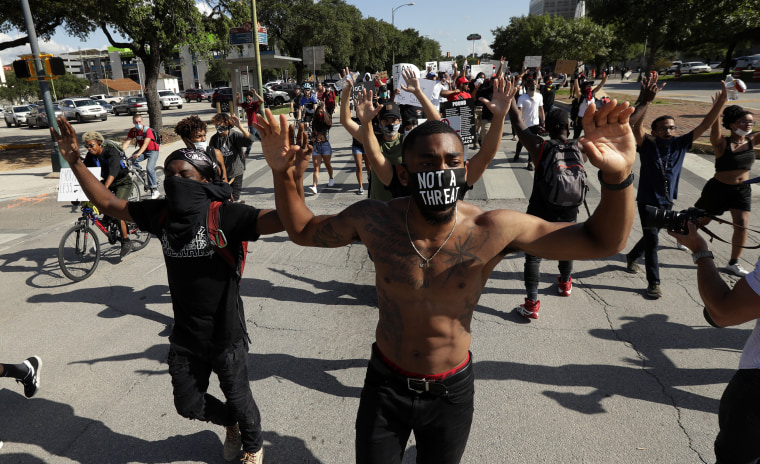SAN ANTONIO — The national debate over police violence has made its way to San Antonio’s municipal elections, leaving voters to decide whether collective bargaining is protecting problem officers.
Along with the mayoral and City Council races, the ballot for San Antonio’s vote Saturday includes Proposition B, which is on the ballot after the advocacy group FIX SAPD got the requisite petition signatures.
The proposition in this majority Latino city has set off a debate over whether the proposal would “defund police” — as the opposition, led by the San Antonio Police Officers Association, the police union, says — or lead to greater police accountability, as FIX SAPD touts.
Supporters of Proposition B want to do away with police officers' use of arbitrators, who have the authority to override firing and disciplinary decisions of the police chief.
According to a San Antonio Express-News analysis, arbitrators have returned 10 police officers who had been fired to the force, reversing 14 percent of the police chief’s terminations.
Ananda Tomas, FIX SAPD's deputy director, said police have used collective bargaining to shield police from accountability.
“If we can do this here, we can send a message that the citizens, community residents, can do this in other places to take on problematic police contracts, overpowered police unions,” Tomas said.
The ballot question is wrapped up in complex labor procedures that would exchange collective bargaining for what is known as “meet and confer” negotiations over contracts.
'Ability to hold bad officers accountable'
The ballot question has drawn local celebrities and leaders into the fray: San Antonio Spurs coach Gregg Popovich has endorsed the proposition, as has former Mayor Julián Castro, who was secretary of housing and urban development in the Obama administration.
As a 2020 presidential candidate, Castro led the field in pushing police reform as a campaign issue, often ticking off the names of victims of police violence on the trail.
He also is a strong proponent of unions and workers’ rights. But he said the police union has been unwilling to budge over the years on improving accountability and transparency, so he has little trouble voting for the proposition.
“They carry guns, and they have a license to shoot,” Castro said. “I support compensating police officers well, and I always have. ... I don’t believe the ability to hold bad officers accountable for misconduct belongs at the bargaining table.”
The proposition did not end up on the ballot because of a single, galvanizing case of police violence — although proponents have raised issues about some cases. It came from local residents, spurred by national events, looking inward at their city’s practices and record, Tomas said.
Although it is led by Black residents, the movement behind the proposition puts the police reform issue front and center in a city that is about 64 percent Latino, 25 percent white and 6.4 percent African American.
Often police reform is portrayed through a Black-white prism, but the ballot initiative shines a spotlight on police violence against Latinos.
Last week, a federal appeals court overturned a part of a district court judge’s ruling that cleared officers involved in the 2013 arrest and death of Jesse Aguirre, the Express-News reported.
Aguirre was handcuffed and flipped headfirst over a concrete barrier. He died as three officers pressed their weight on him to restrain him.
'At the city's mercy,' says police union
Danny Diaz, president of the San Antonio Police Officers Association, said the city doesn’t have the same issues that “they have up north.”
“We’re making changes. We see reform. We understand, and we are working toward fixing things that everybody would be happy with,” Diaz said. “But until the election is over, we don’t know what is going to happen.”
Without collective bargaining, there is no legal obligation for the city to negotiate on contracts, said Diaz, who took over the union in February.
He said police officers' health insurance and an agreement with the city to replace police vehicles when their odometers hit 75,000 miles could be in jeopardy.
“If this gets repealed, we’ll basically be at the city’s mercy,” Diaz said.
He also argued that if benefits aren't comparable in a contract negotiated without collective bargaining, the department will have trouble recruiting officers.
“There’s no guarantee there’s going to be any pay and benefits, at least comparable to what we have now,” he said. “We would be at-will employees.”
If they approve the proposition, voters would in essence take the city out from under Chapter 174 of the Texas Local Government Code, which residents voted to abide by in 1974.
However, another set of laws, Chapter 143, would still apply, preserving some disciplinary measures.
Early voting began the day before the conviction of former Minneapolis police Officer Derek Chauvin of the murder of George Floyd, whose death set off international protests against police violence and racism.
As the early vote ended Tuesday, police in Alameda, California, released body-camera video of the death of Mario Gonzalez in an arrest April 19.
San Antonio is in Bexar County, which reported strong turnout during the early voting period.

